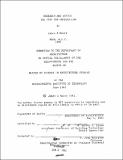Research and design : the need for integration
Author(s)
Moore, James A. (James Andrew), 1959-
DownloadFull printable version (7.062Mb)
Other Contributors
Massachusetts Institute of Technology. Dept. of Architecture.
Advisor
Harvey J. Bryan.
Terms of use
Metadata
Show full item recordAbstract
Today's architectural knowledge base is a heterogeneous mixture of empirical wisdom generated in numberless ways by thousands of practitioners through centuries' of trial-and-error. Architecture has never developed a professionally recognized system or research, nor any organized method for continuously developing the body of commonly held knowledge. Traditionally, this lack or organization has not hindered the profession's ability to successfully integrate available means to meet the desired ends. The past decades, however, have produced a myriad of new techniques, materials, building products and. processes, and a similar increase in societal demands. The abundance of knowledge necessary for successful intuitive design has overwhelmed the traditional methods of assimilation. The lack of an organized knowledge base and the means of producing such a base threaten the ability of the profession to fulfill its traditional responsibilities. Research entails the organized production of knowledge, and for over twenty five years, architecture has been struggling to develop an effective form of research. Initial attempts, however, have generally not had any tangible results; borrowed almost directly from science, investigative methods have not been tailored to the needs or nature of architecture. Architectural design is not a pure science; the scientific method, unadapted, in not an appropriate method of inquiry. Traditional methods of architectural inquiry can be updated and combined with appropriately modified scientific attitudes to form an effective system of architectural research. Initially, the relationship between organized inquiry and design must be clarified, and the work of the former directed towards the needs of the latter. To effect the integration between analysis and synthesis, a new type of professional must emerge, the facilitator. With a background in both design and research, the facilitator will be able to fill a variety of roles within the profession, always working to develop a systematic and effective way of adding new information to the knowledge base and bringing this knowledge into professional practice. Intuition is still the foundation of successful design, but intuition can spring only from knowledge. Organized research is a means of providing such knowledge, but only if research is appropriate to both the subject and the user.
Description
Thesis (M.S.)--Massachusetts Institute of Technology, Dept. of Architecture, 1982. MICROFICHE COPY AVAILABLE IN ARCHIVES AND ROTCH. Includes bibliographical references (leaves 109-112).
Date issued
1982Department
Massachusetts Institute of Technology. Department of ArchitecturePublisher
Massachusetts Institute of Technology
Keywords
Architecture.